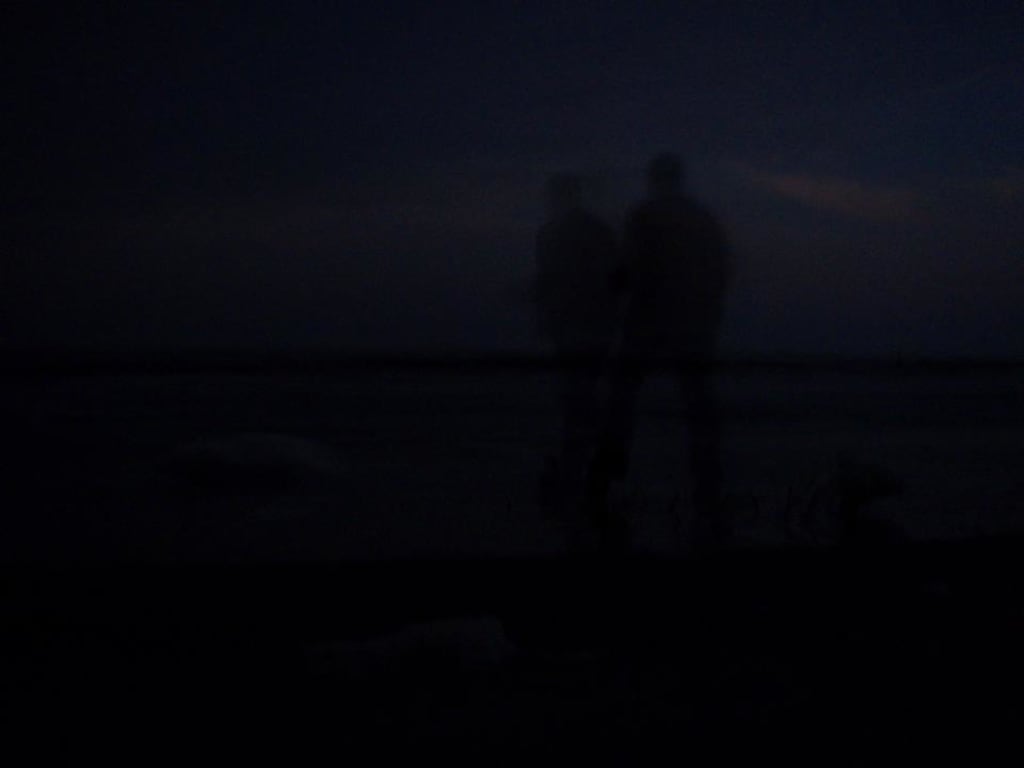
She was on the island when it began.
The lights flickered above the small table. They were just six miles from the mainland, but it might as well have been a thousand. The ocean had turned against them, so very suddenly it seemed, though there were a great many who had been predicting such an event. They’d spoken as often and loudly as they could over the years - about the acidification of the oceans, rising water temperatures, and the melting of the glaciers and icebergs. She hadn’t understood it all, or maybe hadn’t paid enough attention, but she should have, she knew now.
They played cards at that small table every night, strangers who had known one another for years, trying to ignore the sound of the wind outside. Every afternoon, there had been these storms. She remembered summers at her grandmother’s house when she was young, and the high, billowing clouds that gathered quickly in the heat and then eventually cracked open over the ocean. She could still smell the wet asphalt of the road home, see the way it steamed in the hot rain, and feel the cold shock of the air conditioning when they stumbled inside, dripping and breathless, as goosebumps formed on their arms.
These storms were not like that. The ocean was too warm now, and too angry. Each morning began an argument between the sea and the sky that the water always won. The storms had started almost a year ago, the same day they heard the first warnings from the Coast Guard. They had still had internet, at first, and saw the stories from around the world. The hurricanes, the typhoons, and - everywhere where the land met water - the storms.
When the heat of the day reached its peak, the marsh hens quieted, and the swallows disappeared from the sky. That’s how they had recognized it at first, that it was starting to happen here, too. There was an absence of sound and movement of living things, from this place that had never stopped moving.
If the tide wasn’t coming, it was supposed to be going, but the storms took and released so much water that the tides as they had known them were erased by what came from the sky. There were no real sunrises or sunsets anymore, either, because it was usually too cloudy. She didn’t like the thought of never seeing another sunset over the marsh again, but every evening it rained hard, until morning. She was starting to forget the way the blood orange sunset tasted, the way the colors could steal the breath right out your chest.
The first day or two, they walked down to the north dock to see the storms come in. The ocean would rise up, in great big, angry waves, and the clouds that had been building throughout the day would come down from the sky and form giant circles, rotating in growing motions until they touched the surface of the water and started to raise it back up with them. Water moving up towards the sky, towards the clouds. It was terrifying to watch, and after the first few days, they stayed inside. They could only guess what was happening on the mainland, and watch the tornados that came down in the distance.
Now, they spent their evenings inside the low, dark, dining hall, with the radio up loud to muffle the sound of thunder and the water spouts whose remnants occasionally crashed against the windows. They had boarded up the walls, but she wasn’t not sure how much longer the wood would hold up against the afternoon furies.
This afternoon, she looked around at the others. Some of them she had known for over a decade, their paths crossing on the island depending on the season and their research schedules. There were a few staff members who grew up on the coast and who, before, had known the ocean and the tides like they knew the own rhythm of their breath. What surrounded them now, though, she knew, is not the same water that they grew up on, in. None of them knew this water.
Over the years, she had tried to learn the way each channel and creek filled, and emptied. The way the southern end of the island would flood in the winter storms, and the northern end in the spring. She had once seen a fog rise up from the ocean on Middle Beach, becoming so thick that you could hear but not see the waves even when they were just a few steps away, and then it raced across the sand to rise up over the trees as it headed towards the island. She’d stood in that fog, and felt untethered to any of the normal physical laws of the universe as she thought she knew them. All around her was water in the sky, moving fucking up, and even though she was a scientist herself, she’d given in then to the feeling of not knowing how the world really worked. But she hadn’t known she would see it happen like this, and she wasn’t ready for it. That time in the fog on the beach, he had been there beside her, and it had felt magical. Like a gift. Not like this.
Now, sometimes, she felt so alone that she didn’t know if she was real anymore. Every day they readied themselves for the storms, and then waited to see if they would make it through the night to see the next one. She remembered stories of the hurricanes long ago, and how the enslaved people who worked this land were left behind to make it through them, any way they could. They would climb high up into the trees and tie themselves to them. She wondered if they would do that too, soon. She hadn’t talked about that possibility with anyone yet…about which trees they should tether themselves to, if it came to that.
One of the boatmen laid his cards down on the table, and went to open the door to check on the generator. They would run out of gas, soon, they all knew. The underground tank was almost empty. She heard the creak of the handle, and then his voice, higher than normal, saying, “Oh, shit.” She turned around in her chair to see him wipe the rain from his face, and then look down at his boots as a small river of water ran past them. “I’m sorry,” he said, slamming the door hard in its frame, and backing away as they all instinctively raised their feet off the floor. She glanced at her boots, and they were dry, so she tucked them under her legs in her chair. The rain, they had learned, was relatively safe, but the storm surge from the ocean was too acidic for bare skin, and would eat away at their shoes.
The water moved slowly across the concrete, and when it settled in the low spots of the floor they pushed their chairs back and gathered around the far end of the table to look at the map of the island, again. The storm surges were coming higher and closer to the lab, but this was the first time the water had come inside.
They would have to move soon. They talked about the boats, again - there were four of them, tied to the dock just a hundred yards from the lab, but the motors were all shot. The last they had heard from the mainland, things were just as bad. The planes on the mainland must have been destroyed as well, because they never saw any flying after those first few days. The afternoon storms were pushing water up the rivers that lined the coast, breaching their banks and flooding miles and miles inland, too. Even if they left in the morning, with a favorable tide to help them, they might not make it far enough to find a safe place to dock.
There were five boats when it began. The second day, one of the staff packed up and left, anxious to get to his family. But soon after he put in, the engine cut out, the motor and electrical lines eaten by the water. They kept in contact with him as he floated on the tide, and then got stuck in the marsh, until his radio began to crackle as the winds picked up. They climbed onto the roof of the barn the next morning with binoculars, to look for his boat in the marsh, but they never saw anything.
They talked about gathering supplies and heading south from the compound, to the Hickory Ridge, the highest spot on the island. They had been there the day before to look for deer, and to see if the water was coming up inside the old tabby buildings there, that had survived a hundred and fifty years of storms. But, if they took the vehicles down there, they might not be able to get back to the compound and the boats. Though what good would the trucks or boats even be, then, with nowhere else to go?
When the rain let up, around midnight, they walked back to the barn where they had been sleeping, up on the second floor. They stepped lightly around one another to find their pallets, and when she lay down she reached up and played with the necklace she wore around her neck, moving it back and forth across her chest on the small, thin chain. The last time they were on the island together - the trip just before the storms started - he’d given it to her. None of the rings he had on then would fit her, and he laughed as he said the necklace would have to do, and she laughed too, until they were both crying. They had always created their own kind of storm on the island, for a long time before that, and he left in the middle of one of them. But she had always thought he would come back.
She hadn’t known that you could fall in love with a place the same way that you fell in love with a person, but she had, with both of them. If they hadn't had that fight, he would have been there with her on this trip, and he would be laying beside her in the barn tonight. She had always thought there would be more time, to make things right. They all had thought that, she supposed - that they had more time before things got really bad. Probably everyone who had ever lived had had that same thought, and that made her feel a little better, for a moment.
Whatever they decided to do in the morning didn’t really matter, she realized, laying down on her cold, damp blanket. There were no right things to do now - to stay, or leave, to take the boats, or to go to the Hickory Ridge - but she wanted him to be there to make the decision, to see his jaw set in that way she used to hate. The way it did when he’d made up his mind about something. Even if it wasn’t the right thing, he had always been so damn sure. She hadn’t ever considered that she would miss that about him.
There was nowhere else to go, and nothing much left to do, but some part of her thought that he would have been able to make that feeling feel alright, too. She turned over to her other side, reached her hand up again to her chest to grasp the locket, and closed her eyes as the winds picked up again.
About the Creator
Ruthie
Singer in storms.






Comments
There are no comments for this story
Be the first to respond and start the conversation.